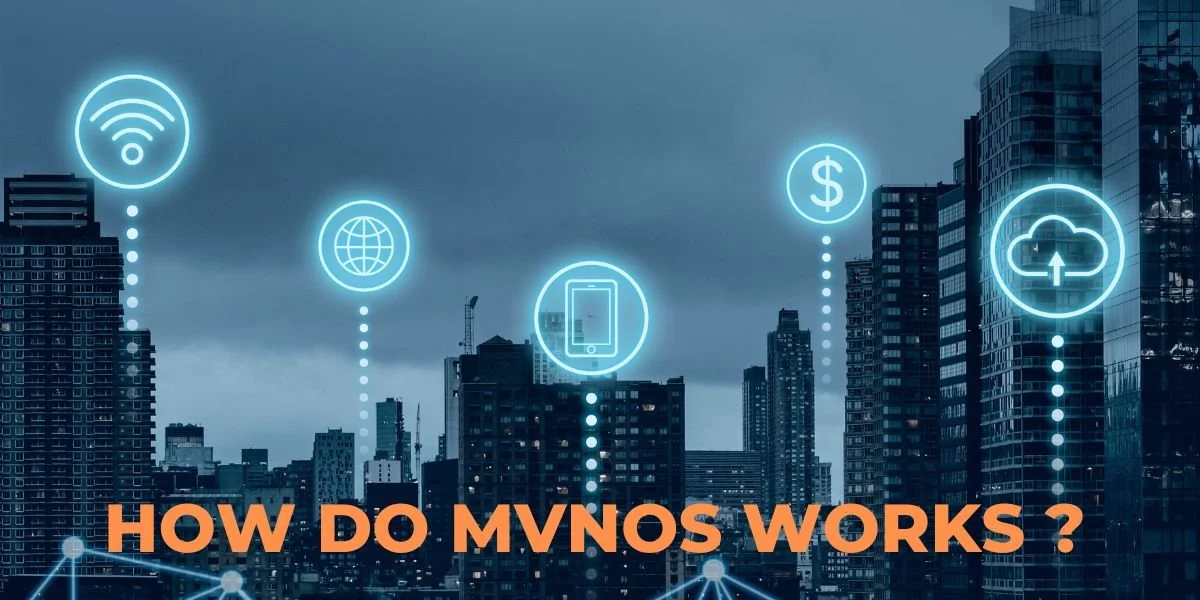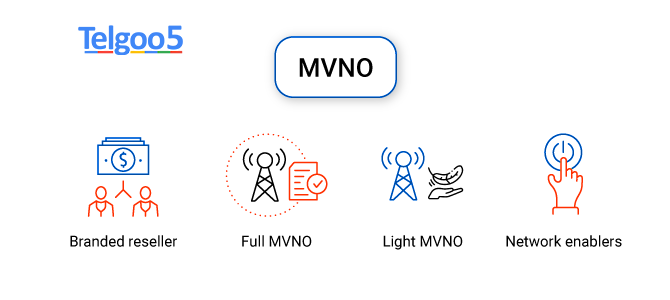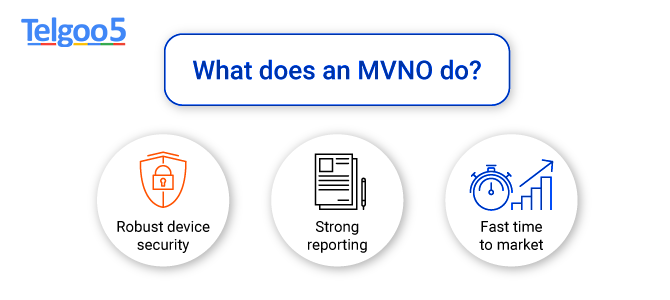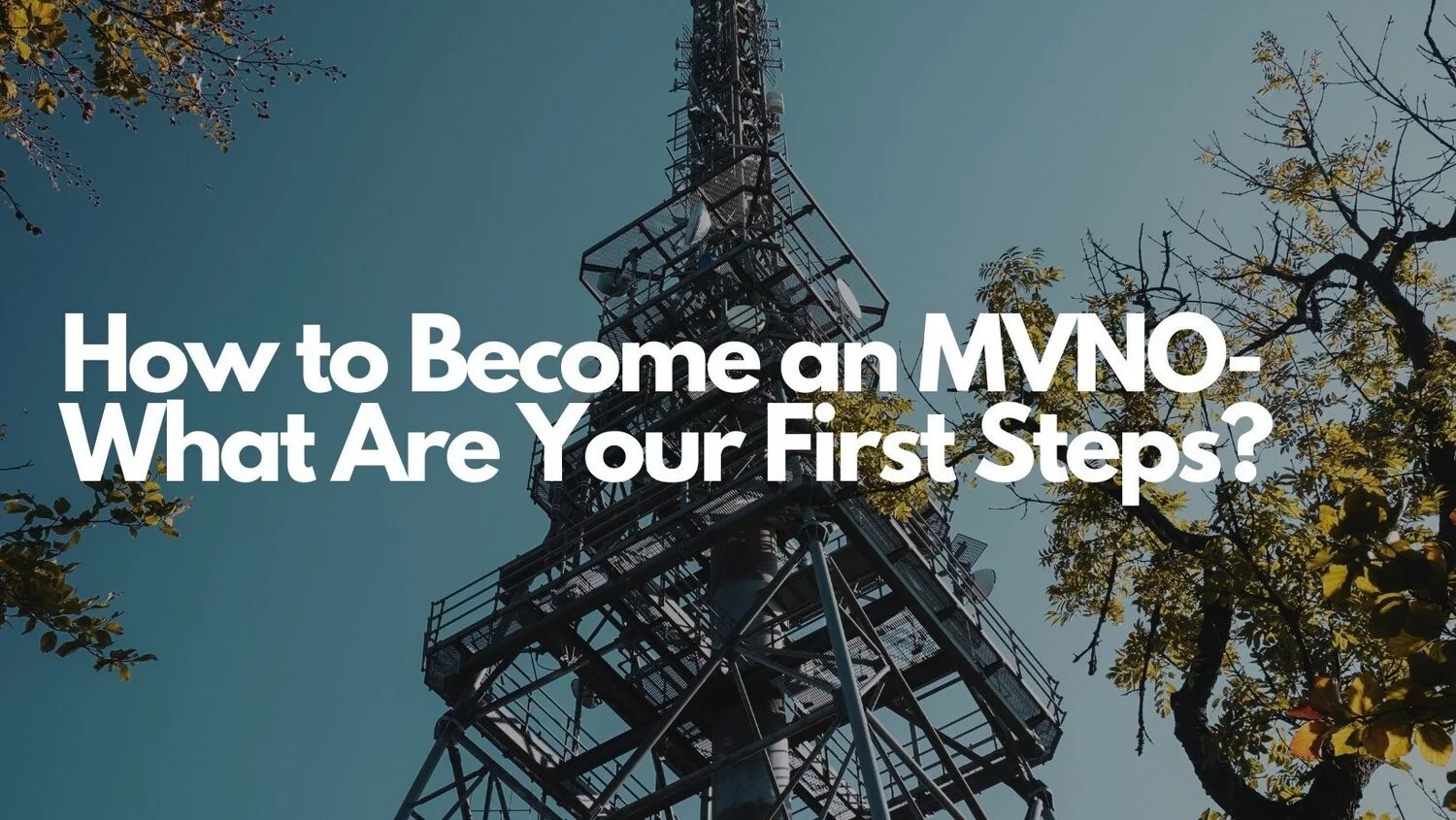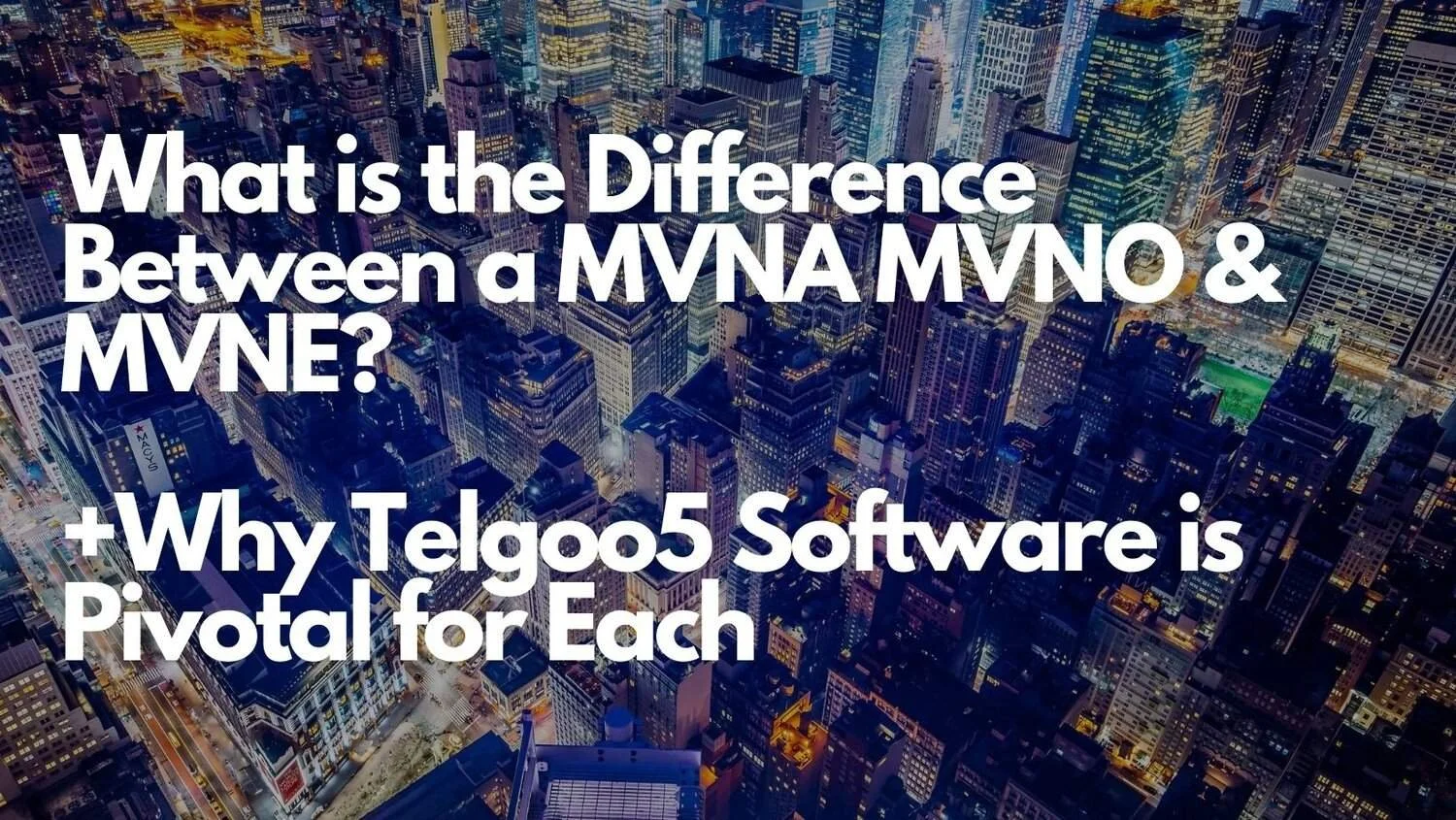How Do MVNOs Work?
Mobile Virtual Network Operators (MVNOs) are companies that offer mobile services, such as voice and data plans, without owning the underlying network infrastructure. Instead, MVNOs lease network capacity from one or more mobile network operators (MNOs), such as AT&T, Verizon, or T-Mobile, and then rebrand and sell that capacity to their customers. In this way, MVNOs are able to offer competitive pricing and tailored services without the significant investments required to build and maintain their own networks.
Three criteria are commonly used to classify MVNOs
Yes, MVNOs are often classified based on three criteria:
Business Model: MVNOs can operate as service resellers, which means they simply resell the services of a single MNO, or as full MVNOs, which have more control over the services they offer, including pricing, branding, and customer management.
Customer Segment: MVNOs can target specific customer segments, such as budget-conscious consumers, business customers, or ethnic groups, and tailor their services accordingly.
Service Offering: MVNOs can focus on offering specific services, such as voice, data, or both. Some MVNOs also offer value-added services, such as international calling or roaming, that are not typically included in traditional mobile plans.
By using these criteria, MVNOs can differentiate themselves from the traditional MNOs and offer unique and customized mobile services to their customers.
Mobile Virtual Network Operators offer the following connectivity services
Mobile Virtual Network Operators (MVNOs) typically offer the following connectivity services to their customers:
Voice Calls: MVNOs offer voice call services, allowing customers to make and receive calls using their mobile devices.
Text Messaging: MVNOs also offer text messaging services, allowing customers to send and receive text messages.
Mobile Data: MVNOs offer mobile data services, which allow customers to use the internet, browse websites, and use data-intensive applications, such as streaming music or video.
Mobile Broadband: Some MVNOs offer mobile broadband services, which provide high-speed internet connectivity for laptops and other devices using a mobile data connection.
International Roaming: Some MVNOs offer international roaming services, allowing customers to use their mobile devices while traveling abroad.
Mobile Hotspot: MVNOs also offer mobile hotspot services, which allow customers to share their mobile data connection with other devices.
By offering these services, MVNOs provide a comprehensive mobile experience for their customers and offer alternative options to traditional mobile services.
Now that we know how MVNOs work and the services they provide, let us look at a few examples of Mobile Virtual Network Operators
Summary:
Mobile Virtual Network Operators (MVNOs) are companies that offer mobile services, such as voice and data plans, without owning the underlying network infrastructure. They lease network capacity from one or more mobile network operators (MNOs) and rebrand and sell that capacity to their customers.
MVNOs are classified based on their business model, customer segment, and service offering. They offer a variety of connectivity services, including voice calls, text messaging, mobile data, mobile broadband, international roaming, and mobile hotspot services. MVNOs provide a cost-effective and flexible alternative to traditional mobile services and target specific customer segments with tailored services. Examples of MVNOs include Boost Mobile, Virgin Mobile, TracFone, Google Fi, and Metro by T-Mobile.
What is a mobile virtual network operator (MVNO)?
A mobile virtual network operator (MVNO) is a telecommunications service provider that offers mobile phone services, but does not own the infrastructure to provide them. Instead, MVNOs purchase network services wholesale from one or more mobile network operators and then rebrand and sell these services to customers under their own name.
A mobile virtual network operator (MVNO) is a telecommunications service provider that offers mobile phone services, but does not own the infrastructure to provide them. Instead, MVNOs purchase network services wholesale from one or more mobile network operators and then rebrand and sell these services to customers under their own name. This allows MVNOs to offer competitive mobile phone plans and services without having to invest in the expensive infrastructure required to support a mobile network.
What makes a mobile virtual networks operator unique?
A mobile virtual network operator (MVNO) is unique in the following ways:
Rebranding: MVNOs purchase network services from mobile network operators and rebrand the services under their own name, creating a unique customer experience.
Independent pricing and plans: MVNOs have the flexibility to offer their own pricing and plans, separate from the mobile network operators they purchase services from.
Targeted demographics: MVNOs often target specific demographics, such as budget-conscious consumers, seniors, or specific ethnic groups, with tailored services and plans.
Reduced infrastructure costs: MVNOs do not need to invest in the infrastructure required to support a mobile network, reducing their overhead costs and allowing them to offer more competitive prices.
Faster service and product innovation: MVNOs can be more agile and flexible in introducing new services and products, as they do not need to invest in upgrading their own infrastructure.
These unique characteristics make MVNOs a popular alternative for consumers looking for more affordable and customized mobile phone services.
What does an MVNO do?
A mobile virtual network operator (MVNO) provides mobile phone services to consumers, but does not own the infrastructure to support these services. Instead, an MVNO purchases network services wholesale from one or more mobile network operators and then rebrands and sells these services to its customers under its own name. An MVNO is responsible for the following activities:
1. Marketing and customer acquisition: MVNOs market and sell their services to their target customers.
2. Customer service and support: MVNOs handle customer service and support for their subscribers, including billing, technical support, and troubleshooting.
3. Network management: MVNOs manage the network services they purchase from mobile network operators to ensure reliable and high-quality coverage for their customers.
4. Plan and pricing management: MVNOs set their own pricing and plans for their customers, offering a unique and customized experience.
5. Mobile phone and device sales: MVNOs may also sell mobile phones and devices to their customers, either directly or through partnerships with manufacturers.
In summary, MVNOs are responsible for the end-to-end customer experience, from marketing and customer acquisition to customer service and support, all while leveraging the network infrastructure of mobile network operators.
Why do mobile network operators need MVNO?
Mobile network operators partner with mobile virtual network operators (MVNOs) for several reasons, including:
1. Increased revenue: MVNOs purchase network services wholesale from mobile network operators and rebrand and sell these services to their own customers. This provides mobile network operators with additional revenue from the sale of network services to MVNOs.
2. Customer acquisition and retention: MVNOs can target specific customer segments, such as budget-conscious consumers, seniors, or specific ethnic groups, and help mobile network operators reach and retain these customers.
3. Better use of excess network capacity: Mobile network operators often have excess network capacity, and partnering with MVNOs helps them make better use of this capacity, improving their overall utilization and efficiency.
4. Increased brand exposure: MVNOs can promote and advertise the mobile network operator's brand, increasing its visibility and exposure in the market.
5. Innovation: MVNOs can introduce new services and products more quickly and easily than mobile network operators, providing a way for the latter to stay innovative and competitive in the market.
Overall, MVNO partnerships can help mobile network operators increase revenue, reach new customers, improve network utilization, increase brand exposure, and drive innovation.
What kind of MVNOs are there?
There are several types of mobile virtual network operators (MVNOs), including:
1. Discount MVNOs: These MVNOs target budget-conscious consumers with low-priced plans and services, often using the network of a single mobile network operator.
2. Niche MVNOs: These MVNOs target specific customer segments, such as seniors, ethnic groups, or travelers, with tailored services and plans.
3. Full-service MVNOs: These MVNOs offer a full range of mobile phone services, including voice, data, and text, and often partner with multiple mobile network operators to ensure broad coverage.
4. Data-focused MVNOs: These MVNOs focus on providing high-speed data services, such as mobile internet and hotspot services, to their customers.
5. Branded MVNOs: These MVNOs are often owned by large brands, such as supermarkets or cable companies, and offer mobile phone services under their own brand name.
6. Enterprise MVNOs: These MVNOs cater to the needs of businesses and organizations, offering customized mobile phone plans and services for their employees.
Each type of MVNO offers a unique set of services and plans, targeting different customer segments and providing a competitive alternative to traditional mobile network operators.
What do MVNOs need to be competitive?
To be competitive, MVNOs (Mobile Virtual Network Operators) need the following key elements:
1. Cost-effective network access: MVNOs need to secure a reliable and cost-effective access to a mobile network from a host carrier, often at wholesale rates.
2. Unique Value Proposition: MVNOs need to differentiate themselves from other providers by offering a unique value proposition to their customers, such as lower prices, specialized services or targeted customer segments.
3. Strong Brand: MVNOs need to have a strong brand that resonates with their target customers, and effective marketing to reach and retain them.
4. Good customer service: MVNOs need to provide high-quality customer service to ensure customer satisfaction and loyalty.
5. Flexible business model: MVNOs need to have the ability to quickly adapt to changing market conditions and customer demands, with a flexible business model that allows them to offer new services and packages as needed.
6. Effective back-end operations: MVNOs need to have an effective back-end operation, including billing, customer service, and network management, to support their customer-facing activities and ensure a seamless customer experience.
The Relationship Between MVNOs and MVNEs | Full Guide
Telgoo5 offers both MVNO and MVNE services to small and medium-sized telecom companies. Contact Telgoo5 today to learn more.
To create and run a successful MVNO business, you have to take care of several responsibilities. Offer personalized services to users. Execute effective marketing strategies. Keep up with the contract with your MNO. Data analysis. And so on.
For most small to medium-sized MVNOs, these duties are too much to handle. They have two choices. Either work with many third-party companies and essentially endanger customer data, or hire an MVNE to take care of all administrative duties and focus on selling personalized offers to customers.
We will break down what MVNOs and MVNEs are and the relationship between the two. Let's get started.
What Is an MVNO?
An MVNO is a network operator who buys bulk telecom services from an MNO and resells them to users. An MVNO is usually focused on providing very personalized and streamlined services to customers.
Verizon and T-mobile are examples of MNOs that sell network infrastructure to MVNOs like Virgin Mobile and Walmart Mobile.
Some MVNOs are extensive enough to offer the full range of telecom services from voice to data connectivity. These companies, called full MVNOs, develop their billing systems, produce their own SIM cards, and manage their charging systems.
Light MVNOs depend on the MNO to take care of connectivity. All they do is provide niche services and marketing to their audience.
What Is an MVNE?
MVNE stands for Mobile Virtual Network Enablers. These telecom companies work with MVNOs to ensure the smoothness of service. They are there to make life easier for the startup MVNO.
Remember the reason why MVNOs are in the market in the first place. They are there to provide niche and personalized services that the large MNO cannot offer its users.
An MVNO, especially a full one, has several responsibilities, including providing connectivity services, tariffs, personalized services, and customer support.
Many MVNOs cannot handle it all, so they reach out to MVNEs to help. MVNEs take care of the customer support and the administrative work for the MVNOs. This frees the MVNOs to focus on developing streamlined offers for their users.
It's common to find one MVNE working with several MVNOs.
Benefits of Working With an MVNE
1. A Reliable Online Charging System
MVNOs now use online charging systems to bill customers accurately. Online charging systems bill customers in real-time, which allows for greater transparency and an increase in customer trust.
The thing is, most MVNOs cannot invest in creating their own OCS solution. On the other hand, MVNEs have OCSs already in place.
It's cheaper and easier for the MVNO to hire an MVNE to take care of charging customers.
2. Specialized Customer Service
As an MVNO grows and acquires more customers, the need for a systematized customer service center becomes more urgent. A startup MVNO either creates a new department and hires many support reps or outsources to a third-party company.
An MVNO should outsource customer service to an MVNE because they have staff specifically trained to cater to telecom users. Hiring an MVNE to care for customer service saves an MVNO money and time.
3. Reduced Spending Costs
The MVNE takes on all the administrative duties of an MVNO, which saves the MVNO from spending money to recruit more staff and take care of billing, customer support, and data analysis.
Telgoo5 offers both MVNO and MVNE services to small and medium-sized telecom companies. Contact Telgoo5 today to learn more.
The Complete Guide to MVNOs and the Services They Provide
Telgoo5 sets up MVNOs for businesses and service centers. Feel free to browse our full range of options.
Introduction to MVNO
Think of a large Mobile Network Operator like Sprint. Sprint owns cell towers and antennas, and directly sells network connectivity to users. Then, think of a smaller network like Tello. Tello does not own network infrastructure. Instead, it buys "space" in bulk from Sprint and resells to users. Tello is an MVNO.
MVNO stands for Mobile Virtual Network Operator. MVNO is a network operator that buys access from an MNO, and then resells to consumers. The first MVNO was launched in the UK and quickly became popular because of cheaper rates and better targeting.
MVNOs are partly or fully owned by MNOs. In other words, while some MVNOs have exclusive agreements with single MNOs, others buy network access from multiple MNOs.
Different Types of Services Offered by MVNOs
The services provided by an MVNO are dependent on which kind it is. Here are the four main types of MVNOs.
Full MVNOs
The only thing that full MVNOs get from an MNO is connectivity, that is, access to network antennas. Full MVNOs develop and manage their core network infrastructure and billing systems. They manufacture their own SIM cards and manage call flows and data flows. They develop and sell network services. In addition to doing these, they also take care of customer relations and branding.
Light MVNOs
Light MVNOs have no business with managing connectivity. It's MNOs that take care of that. Light MVNOs are only concerned about their customers. They throw weight behind customer relations, branding, niche services, and marketing. Light MVNOs are perfect for service and branding-oriented businesses looking to service an underserved niche.
Branded Resellers
Branded Resellers, also called reseller MVNOs, operate by selling access to an already existing customer base. What they do is sign a contract with an MNO, either use the same brand or rebrand to a new MVNO, and then resell the MNO services to their audience.
The main thing branded resellers do is sales, distribution, and marketing. The MNO remains in full control of network services and tariffs, while the reseller MVNO worries about selling to more users.
Is it Worth Switching to an MVNO?
Fewer service costs
The main attraction of MVNOs is that they offer lower-cost services. They buy from the MNOs and resell at cheaper prices.
It works this way. An MNO often has a broad customer base. In trying to offer a solid service to everyone in their base, MNOs have services that are broad, inflexible, underused, and overpaid. MVNOs focus on a smaller niche, customize their offerings, and so sell at cheaper prices.
Customized services
MVNOs focus on a smaller number of users and are concerned with segmenting their customer base to offer personalized services. Even though MVNOs have the disadvantage that MNOs prefer their direct users to MVNO users, it rarely happens that a situation occurs where a network has to choose who to service.
How Do I Choose Which One is Best for me?
The best way to select an MVNO is to think of your business needs. Find an MVNO that suits your preferences, and has a solid track record.
Telgoo5 sets up MVNOs for businesses and service centers. Feel free to browse our full range of options.
5 Ways MVNOs Impact Your Business
An MVNO, or a Mobile Virtual Network Operator is a communication provider that does not actually own wireless network infrastructure. MVNOs purchase bulk access to infrastructure, and make it available to their own clients.
When it comes to purchasing wireless communication, most businesses do not know where to start. All they know is that they need reliable Internet and phone services to support their business. Cursory research into wireless communication providers reveals too many acronyms and technical terms to understand, and most businesses wind up going with a sub-par solution just to cross the item off of their to-do list. Instead of throwing in the towel, consider using an MVNO for wireless communication.
An MVNO, or a Mobile Virtual Network Operator is a communication provider that does not actually own wireless network infrastructure. MVNOs purchase bulk access to infrastructure, and make it available to their own clients. Most MVNOs are complete businesses with their own marketing, sales, customer support, and billing platforms. In fact, you may purchase wireless communication through an MVNO without even realizing it.
Below are 5 ways MVNOs may impact your business:
MVNOs negotiate rates. As a business, you probably do not have the time or ability to negotiate with wireless network infrastructure owners on your own. All you know is that you need wireless communication, and you need it at a reasonable rate. MVNOs purchase access in bulk, which means they do the rate negotiation for you. They then present you with prices and packages that your business can utilize. Every day, MVNOs save businesses time and effort by negotiating bulk rates before repacking it for their clients.
MVNOs handle wholesale variables. If anything changes at the wholesale level, an MVNO will understand it and handle it, keeping your business completely insulated from changes in the market. Wireless communication is a dynamic market, which means that MVNOs commit to staying on top of significant changes so that their clients do not have to.
MVNOs offer simple billing. The use of wireless communication can vary drastically over any given day, week, month, or year. This can make billing very complicated. In contrast, MVNOs purchase bulk access to wireless communication infrastructures, and often pass that type of purchasing on to their customers. With an MVNO you are paying for access at a negotiated rate. You are not accountable for every single minute of communication you use. This makes billing simple and easy to understand.
MVNOs can tailor their packages to your needs. Since MVNOs do not need to maintain their own networks, they have the freedom to create more tailored solutions for their clients. They have the funds and the resources to create custom packages, which makes them a fantastic option for most businesses.
MVNOs provide a better customer experience. As a reseller, MVNOs have the capacity to dedicate significant resources to customer care and support. You are more likely to get personal, dedicated support from an MVNO than from an MNO (Mobile Network Operator).
So if your business needs inexpensive, highly customized, well-supported wireless communication, consider purchasing through and MVNO. The hard part is simply remembering what MVNO stands for. The rest is easy. So contact an MVNO today and get your business communication off the ground in no time.
What makes a successful MVNO
Mobile Virtual Network Operators (MVNOs) play a crucial role in the market. They operate as the middlemen between mobile network operators who own wireless network infrastructures, and the end users who want to access wireless communications services.
Mobile Virtual Network Operators (MVNOs) play a crucial role in the market. They operate as the middlemen between mobile network operators who own wireless network infrastructures, and the end users who want to access wireless communications services. Every day, people rely on MVNOs to place calls without even realizing it. The mark of a good MVNO is its ability to reliably and seamlessly provide services such that all but the most savvy customers do not even realize that they are a part of the service equation. If you are considering entering the MVNO space, it is important to understand what success looks like, and the steps you will need to take in order to be successful.
Here are three more qualities that make a successful MVNO:
Reliability:
Frustration surrounding dropped calls is largely universal. When people today pick up their phones to make a call, they are not thinking about the incredible technology that allows them to reach anyone, anywhere, at any time. They do not consider the satellites circling the globe, the wireless network infrastructures that had to be created, or how that infrastructure is leveraged in a way that allocates network connection to them. MVNOs fit into that last and final part of the equation. They ensure that the technology and infrastructure that supports wireless communication is actually delivered to the end user in ways that make them usable. Technology and infrastructure do an end user no good if they cannot access it and use it. A good MVNO ensures connection every single time - without fail and without interruption.
Cost-Effectiveness:
By purchasing bulk access to network services at wholesale rates, MVNOs can provide customized service at price points that work for their target markets. For example, the big 4 providers (AT&T, Verizon, Sprint, and T-Mobile) may not offer customized plans at the same level that MVNOs can. If your target market is price sensitive, as an MVNO you can slice and dice services in a way that is less expensive to the end user, and will therefore drive them to choose you over a large provider.
Strong Relationships:
Successful MVNOs maintain fantastic relationships with the mobile network operators they purchase from. The fact is that MVNOs cannot exist without MNOs, so it is important for MVNOs not to bite the hand that feeds. Strong relationships led to better rates, quicker problem solves, and more services that MVNOs can eventually pass on to their clients. MVNOs that breed tension with MNOs do not last very long in the marketplace. This space is competitive, so in order to ensure success MVNOs have to network effectively.
How Telgoo5 Supports MVNOs:
Telgoo5’s modular platform offers an Omni Channel CRM, billing, online charging, and a payment engine that drives many of the global brands in the MVNO space. We handle business logistics so that MVNOs do not have to. We support connections between MVNOs and their target audience, and we are so effective that most end users do not even realize we are there. If you are looking to launch and/or maintain a successful MVNO, you need to work with Telgoo5.
How to Become an MVNO- What Are Your First Steps?
Starting a MVNO can be quite lucrative, but it is not easy. Set yourself up for success by researching exactly what goes into starting and MVNO, and starting off with a solid plan and strong partners.
Starting a MVNO can be quite lucrative, but it is not easy. Set yourself up for success by researching exactly what goes into starting and MVNO, and starting off with a solid plan and strong partners.
Mobile Virtual Network Operators (MVNOs) provide services to subscribers without needing any radio access network equipment. They are virtual operators only. This means that becoming a MVNO is much easier than it would be should it require any speciality equipment. It is a great option for companies looking to enter the provider space without a significant investment. The first step in becoming a MVNO is establishing a relationship with an MNO (or mobile network operator). Once a roaming agreement is in place, the next step is determining what type of MVNO you want to be.
What kind of MVNO does your company want to be?
Skinny MVNO: This type of company is lean and mean. A skinny MVNO does not own or operate any of their own equipment. They establish a strong relationship with an MNO and simply own their customer service/support, sales, and marketing.
Light MVNO: This is a slightly more significant type of MVNO. They still rely on a strong relationship with an MNO, but in addition to owning customer support, sales, and marketing, they also control the distribution operations of their service and can set their own service prices.
Think MVNO: Now we are moving into a more full-service provider. This type of company supports their customers with their own infrastructure. They own their own GMSC (Gateway Mobile Switching Center) for voice, GGSN (gateway GPRS support node) for data, subscriber services, and an independent billing system.
Full MVNO: This type of MVNO owns their own core network infrastructure. The only thing they lack is their own radio network, for which they still need a relationship with an MNO.
Once you have determined which type of MVNO is right for you, the next step is defining your target market.
Different market segments have different needs and wants. For example, a community of individuals who are 65+ may not have a huge need for data and texting services. In contrast, a millenial or gen Z audience are going to expect a plan with a lot of data availability. Once you have figured out your target market, you can build a business plan.
Lastly, find reliable partners to handle back office outsourcing needs.
Telgoo5 is a fantastic mobile virtual network enabler. We have years of experience helping MVNOs grow and scale. We can handle billing, customer issues, security, and infrastructure. Once you have your plan in place, allow us to help you to implement.
Telgoo5 is an end-to-end cloud based SaaS platform that powers telecommunication services to MSPs, MNOs, MVNOs, MVNEs, and MVNAs. We are established, reliable, and a fantastic partner for you. Whether you are looking to enter this space as a newbie, or an experienced MVNO operator, Telgoo5 is the right partner for you.
What is the Difference Between a MVNA MVNO and MVNE? +Why Telgoo5 Software is Pivotal
MVNO stands for Mobile Virtual Network Operators. It describes a telecom service provider that does not actually own the wireless network infrastructure it uses to provide services to its customers. It is common for MVNOs to access mobile data services via MVNA.
When it comes to the world of telecom services, there is a lot of jargon to learn. The acronym-heavy language can look like greek at first, but once the vocab is demystified everything can be understood. A major part of the difficulty is that a lot of the acronyms look similar, but the systems they represent have distinct differences. Today, we both define and highlight the differences between MVNAs, MVNOs, and MVNEs, along with explaining why Telgoo5 software is pivotal for each.
MVNA
MVNA stands for Mobile Virtual Network Aggregators. It describes a telecom provider that operates in a wholesale capacity. An MVNA provides mobile and data services to Mobile Virtual Network Operators (MVNOs, to be covered in the next section), who then provide billable services to their end users. MVNAs can be challenging to manage, which is where the Telgoo5 platform steps in. Telgoo5 streamlines the billing and operational side of any MVNA business. We help to ensure that services get delivered and that the operator gets paid. Our end-to-end cloud based SaaS platform powers the entire telecom industry, including MVNAs.
MVNO
MVNO stands for Mobile Virtual Network Operators. It describes a telecom service provider that does not actually own the wireless network infrastructure it uses to provide services to its customers. It is common for MVNOs to access mobile data services via MVNA. If you have access to mobile data, there is a chance you are accessing it through an MVNO. Every day, people interact with the telecom business without thinking much about the systems in place to make their connection possible. Telgoo5 offers a fantastic support system to MVNOs. Our modular platform offers an Omni Channel CRM, billing, online charging, and payment engines that drive the global networks that users lean on every single day for data access.
MVNE
MVNE stands for Mobile Virtual Network Enablers. It describes a company that provides network infrastructure like provisioning, administration, operations support systems, and business support systems to MVNOs, who then provide data services to their clients. MVNEs do not actually interact with end-users. While MVNEs are busy supporting MVNOs, Telgoo5 supports MVNEs with our top-notch AT integration that anticipates MVNE needs before they even appear. Telgoo5 appreciates the complexities of the Mobile Virtual Network market and can support companies that provide data services in any capacity.
You may have noticed that the acronyms described above are similar because all three business types operate in the same space - the Mobile Virtual Network space. In many cases, an MVNA provides data to an MVNO, who leans on an MVNE for operational support. The user performing a Google search on his mobile device will have no idea how many companies are involved in making his search happen...unless something goes wrong. Telgoo5 provides an end-to-end cloud-based platform that powers everyone in the MVNE space, with the goal of always providing uninterrupted service to the end-user.
Do not slog through this complicated space alone. Lean on Telgoo5 for all of your telecom needs. We will smooth out the process and make sure you look good along the way.
Become a Data MVNO to Meet Urgent Work-From-Home Requirements
Nowadays, there are a variety of customers with different purchasing power, and a data MVNO is in the best position to fulfill their requirements.
The value of internet data services is rising with each day. Work-from-home setups have necessitated employees and business owners to invest in Internet data. Whether it is through a stationary broadband connection or mobility, each type of data has its own value. Mobile Virtual Network Operator (MVNO) is a business model that fulfills the void left by MNO services. When it comes to data, an MVNO can dramatically increase its business revenue if it starts focusing specifically on clients’ immediate requirements. Nowadays, there are a variety of customers with different purchasing power, and a data MVNO is in the best position to fulfill their requirements.
Which MVNO Business Model is the Best Suited for Data MVNO?
There are different types of MVNO business models in the market. Without going into the real technicalities, we can categorize them into thick MVNO (with their own network setup), reseller MVNO who use MNO/MVNE network infrastructure and software solutions and thin MVNO who are a hybrid between thick MVNO and reseller mode. Although there are other models as well, the ones mentioned before are the most common.
Considering the exigent need of customers for data, each type of MVNO model can excel at data services, given it has a solid network platform, B/OSS and telecom billing solutions. Even the reseller MVNO can excel at data services with the right kind of software support and APIs. Providing customers self-care option where they can create their very own data plans, set the data limit and upgrade their plans is very much required for success as an MVNO.
Important Characteristics of MVNO Software in 2021
In 2021, you need to have a next-gen telecom support platform if you want to be successful. With an MVNO platform that has the following characteristics, you can serve customers’ data-related needs easily:
Online Charging System
Revenue assurance is very much needed in 2021 as you need to forge a bond of trust with your customers in these testing times. An Online Charging System (OCS) charges every service in real-time and ensures complete revenue assurance at every step. It also helps you monetize services quickly and enforce credit limits. Therefore, you customers never have to pay more than what is necessary.
CRM
The MVNO software needs to come with a CRM that is tailor-made to the requirements. If your customer care reps can access customer data quickly and resolve their queries in time, it becomes that much easier to foster customer trust.
As employees start working from home, you can expect a lot of amateurs to call support for help. A quality CRM like the one provided by Telgoo5 can really improve the entire process of customer services.
Serve Every Market Better with Superior Billing Support Systems
Telecom operators have evolved over the years from being product-centric to customer-centric. The shift in approach hasn’t actually changed the way things are done on a technical level, but it has transformed the business aspect considerably. Whether it is a fully-functional CSP (Communication Service Provider) e.g. Verizon or just an MVNO (Mobile Virtual Network Operator) e.g. Liberty Wireless, the change in business model is pretty evident. Especially the smaller players i.e. MVNO are increasingly focusing on the customer experience who are using their services. With MVNE (Mobile Virtual Network Enabler) handling their requirements on technical front, they are more concerned about the more visible aspects such as billing support systems.
Improving the Customer Experience with Better Billing Support Systems
A Billing Support System is the most important piece of software in the repertoire of telecom operators. It allows them to alter their monetization strategies, offer a better point of sale and at the same time improves revenue assurance.
Essential requirements of modern-day billing systems:
Real-time charging
At the least, every MVNO should have a real-time charging platform. Such a platform is an integral part of telco strategy in the modern times. It allows for consolidated billing service, which is an absolute must-have. As almost every operator nowadays deals in more than one telecom service, it makes no sense to send separate bills. Especially when your competitors are already using convergent billing, you cannot afford to stay behind the 8 ball. A real-time charging system offers greater revenue assurance and allows you to bill prepaid, postpaid, broadband services at the same place.
Greater control over monetization strategy
The complexity of telecom domain is rising as we speak. There is no avoiding the technicalities if you want to be successful in the domain. Hence, it is essential that you have an intuitive telecom billing platform that allows for greater control over monetization. You should be able to monetize every service at the same place and serve your customers better. For example, intuitive platforms like Telgoo5 abstracts you from intricacies such as interconnect billing, tax application, vendor partnership payments etc. All you need to do is mix and match different services to create telecom services plans that appeal to your customer base.
Not only that, a real-time charging system also implements credit limits accurately. It means customers get timely alerts when they are about to exceed their allotted quota. Also, you are provided APIs, which offer turnkey solutions to emerging requirements. Whether you are a Data MVNO or a dedicated ioT services provider, Telgoo5 can do wonders for your telecom services.
Improvise with Innovative Monetization by Using Top Billing System Software
An intuitive billing and provisioning software solution is needed.
Monetization and billing hold special place in the day-to-day operations of telcos. There are many promising technologies in the market that need to be packaged and delivered in an innovative manner. 5G and IoT are two key technologies that need to be delivered in an attractive manner to the customers. These technologies put heavy burden on the shoulders of telcos, especially Data MVNO and other smaller players in the market. An intuitive billing and provisioning software solution is needed.
Transform Plans into Action Faster
The whole marketing team of a telecom operator tries to exploit market conditions. This is done by analyzing the immediate needs of customers and coming up with plans that fulfill those needs.
Operating a Billing System Software Solution is not the easiest thing to do. To devise a plan, many configurations need to be tweaked. A telecom system should allow for the different tweaks and should be intuitive enough, so that a less technically sound operator can also make the changes.
Real Time Charging For Maximum Impact
A telecom operator needs to get his basic rights if he wants to make the maximum impact with his plans and offers. A real time charging is the minimum requirement in today’s time as it helps in:
Convergent charging for consolidated billing
As both event-based services like SMS and session-based services like voice call are charged at a centralized location i.e., an Online Charging System, it becomes easier for telcos to create consolidated bills. All the charges can be reflected on a single invoice. Consolidated billing provides the necessary incentive for subscribers to stay with a single operator. They can subscribe to voice, SMS, data, broadband and even video streaming services as part of a single vendor partnership. The simplicity and convenience of Convergent Charging is crucial for a modern-day telecom operator.
Accurate implementation of credit limits
If a telecom operator is also performing the role of an IoT billing provider, the implementation of credit limits becomes even more important. Customers of today want complete transparency and do not want to pay a dollar extra. A real time charging platform keeps complete track of every transaction and ensures customers are sent timely reminders about their quota completion. Whether it is prepaid or postpaid services, real time charging is crucial in today’s time.
Revenue assurance
Ensuring proper revenue is the main concern of a telecom operator. Top billing systems like Telgoo5 are unwavering in terms of accuracy of charging. Hence, there is complete accountability for every service and total revenue assurance.
Telgoo5 provides a reliable platform, which is easy to use and completely accurate. It allows telcos to monetize their services in any way, shape or form with minimal efforts.
Price Versus Value; Which is More Important for Your MVNO?
Attempting to keep your head above water in the mobile industry is no easy feat no matter what network you are administering. For Mobile Virtual Network Operators (MVNOs)
Attempting to keep your head above water in the mobile industry is no easy feat no matter what network you are administering. For Mobile Virtual Network Operators (MVNOs), the industry has become very competitive – even really promising start-ups may wind up out in the cold.
To get your MVNO to the next level, you need to consider anything and everything that can be done to improve it. That leads to a very interesting discussion. On the surface, it would appear that price would be the most vital characteristic as all these types of operators exist to offer cheaper services in the first place.
That said, with the vast array of platforms already available, there is only so low you can offer your services in order to stay in the competition. In today’s age, the focus of your brand should be prioritized on one word; value.
Indeed, Value is More Important
The pricing models that your wireless MVNO offers can drive traffic to your network and enhance the chances of it succeeding. When compared with value, however, they will not hold the same level of importance.
One must consider – what can you do to increase the value of the offerings that you have in store? Many providers will deliver what are known as Value Added Services to their consumers. You see, your MVNO service is already going to include the core and primary service packages.
By including Value Added Services, you can vastly improve the quality of your brand by making the overall experience more convenient for your consumer base. In addition to that, they will bring in more revenue per user.
So, instead of simply scaling down your prices, you can offer unique and effective Value Added Services into the fold. Some added services can even place an increased demand on your standard services.
What Types of Options Are Out There?
The exciting news is there are a ton of different offerings out there and tons of unique software that you can invest in and provide to help both you and your customers. There are programs out there that will enable diverse communication between different types of mobile applications and various systems.
This can allow for data to be reused and can help to streamline the entire communication process. On the customer end of things, you can invest in Value Added Services that allow for certain transactions and tasks to be possible. Again, this adds convenience and in the modern world of technology, that is what it is all about.
When it all comes down to it, both price and value are essential but the latter’s importance continues to increase all the time. That makes it all the more important that you carefully consider what Mobile Virtual Network Enabler (MVNE) you partner with.
With our exclusive and top-of-the-line platform coupled with our vast understanding of the industry, you can feel confident partnering with Telgoo5. Our team is always happy to discuss how we can help your brand and answer any inquiries you may have.
Breaking into the market – how to launch an MVNO
Discover the essential components of launching an MVNO successfully. Telgoo5's insights provide a comprehensive guide on how to navigate the market and achieve MVNO success.
Being an MVNO, you are in charge of a business that’s optimized to offer appealing services tailored for specific market segments. By doing this, an MVNO is able to carve out a niche within the market, thereby winning customers that will prefer their services to that of any other MVNO.
When MVNOs become successful, they have the ability to revitalize the market, thereby coming up with services which add value to the customers and in turn convert the value into profit.
It’s important to point out that establishing and running MVNOs is an immersing journey that requires continuous development and the constant ability to meet the needs of customers. At Telgoo5 we have spent the last 15 years helping many businesses create their own MVNOs. As a service provider, we have extensive knowledge of the MVNO market and the best ways to go about setting up an MVNO.
In this blog post, we are going to share insights into the main things that makes MVNOs successful. The first section of this post looks at what is required to get started. We will then highlight the importance of developing your own market insights once the project is up and running.
In the final section of the post, we are going to explore the technical abilities required to become successful in the market.
Starting Out
Starting and operating an MVNO is an unpredictable affair. Clients will expect you to offer several services from the first day. Because of the changes within the market, the popularity of each service can be greatly affected and can change overtime.
Thus, when launching an MVNO, it’s important to understand your target market. On top of that, it’s important to be able to know how to strategically position your product in the market when the change ultimately comes knocking.
All this comes down to preparation. You will have to thoroughly prepare before launching the product. There are two important things to have in place when starting out an MVNO.
A plan on how you are going to reach your target audience, i.e. how you intend on getting your message efficiently across to potential subscribers and how you should package and offer various services to your audience.
Access to technology: You will need access to the technology which will enable you to deliver services required for your target audience. Your technology must be able to quickly adapt to new services you would like to offer.
Creating a plan and Getting Technology
When planning how to reach a specific market, you will notice that it’s a complex task which requires the consideration of specific market dynamics. Generally, there are two main ways that you can break into the market and gain new customers.
Once your marketing plan is in place, the next step would be to ensure that you have access to a reliable technology which will enable you to offer the services that are required as well as the services that may be needed at a later date when your company grows or the market changes. At Telgoo5, we have the technology that will allow you to adapt your company to new trends in the market, thereby expanding your reach.
The Rise of the MVNE
Discover the pivotal role of MVNEs in shaping the telecom industry. Telgoo5's insights dive into the rise of enablers and their transformative impact on MVNO operations.
The MVNO business model is constantly changing. Unlike previous times, MVNOs are no longer reselling MNO services under different brand names while trying to address the needs of different target markets; markets like senior citizens or prepaid calling. Many MVNO’s are keen on expanding their services beyond traditional offerings.
On top of that, we have several industry summits which cater to MNVO’s made possible by the differentiating services offered. Why all these differentiations one may ask? One main reason is that MVNOs are keen on totally differentiating themselves from the MNO networks that they are currently using, so that they can increase their customer base and customer loyalty.
Furthermore, because MVNOs may specialize in marketing unlike MNOs, they might also pick up several trending services – thereby capitalizing on various trends. If you are able to roll out a new and cool service, revenue will likely be impacted positively..
Billing Services
It’s important for an MVNO to have its own billing service. By having a reliable billing service, an MVNO is able to launch new offers, prepaid plans etc. Billing software is expensive to purchase and that’s where MVNEs come in.
By hosting several MVNOs on their platforms, MVNEs are able to minimize the cost on the billing software by sharing the cost with the MVNOs.
Complexity
If an MVNO wants to offer a service where the customers will be able to automatically switch their calls to Wi-Fi, what would they do? A great example is Virgin Mobile, which automatically detects Wi-Fi connections, thereby allowing the users to make free calls.
If an MVNO that does not use the services of an MVNE wanted to allow users to switch off a cellular call automatically to Wi-Fi, some type of infrastructure which will interact with the MNO would be required.
At this point in time the MVNO will be required to get into some type of relationships and service nodes with ISP. This in turn implies more complexity. At Telgoo5, we specialize in offering MVNOs fast and efficient ways of offering new services.
As mentioned earlier, by working with numerous MVNOs, we are able to offer groundbreaking services at affordable prices.
Evolving as an MVNO
Once you have launched as an MVNO, you will begin to evolve as the days goes by. You can measure these evolutions in a number of ways, from revenues collected, profit increases, employee growth or additional services offered. To evolve accordingly, you need an MVNE that clearly knows the most significant aspects of your evolution, market insights.
What MVNO Owners Need to Know About 5G
Uncover the impact of 5G on MVNO operations. Telgoo5's insights provide MVNO owners with valuable knowledge about harnessing the potential of 5G technology.
To keep your Mobile Virtual Network Operator (MVNO) relevant and noteworthy at all times, you always need to be keeping up with the latest mobile trends. Outdated services and offerings will quickly begin to lose you subscribers as consumers are always seeking the “next big thing”.
Said “next big thing” in question here is undoubtedly 5G technology as it has created quite a buzz around the mobile spectrum as of late. For the owner of an MVNO, the vital question becomes ‘how is this going to impact your network and what are the key details that you need to be conscious of?’
There is Potential for 5G Technology to Completely Change the Game
As for what 5G technology is, it is simply the latest wireless network generation. In addition to offering vastly improved speeds, 5G also has the capability of minimizing latency issues. Additionally it is going to enhance flexibility, as it allows for more devices to be connected simultaneously.
Those in the mobile industry have even gone as far as to claim that 5G could be one of the most influential and groundbreaking technologies seen in years. Before long, it will become the standard, and inferior networks will fade out.
Its Availability is Currently Limited
As it stands currently, 5G is not widely available across the major carriers. This is likely to change, as the year 2020 is set to be a monumental one regarding the rise of the 5G technology. It is not as if everyone can get their hands on the improved network; it is a bit more complicated than that.
The true reality is that the full potential of 5G is probably not going to be reached for the next few years. That said the global 5G innovation is going to be making more of an impact than some MVNOs will be ready for.
Current MVNOs are Planning to Offer 5G
One of the potential roadblocks your MVNO network is going to experience is if and when you can get your hands on 5G technology. The carrier or carriers you offer coverage from are going to initially offer their new groundbreaking network to some of their larger partnerships.
The good news is there are smaller brands that are intending to provide 5G-based services. Several MVNO owners have gone on record to claim that their platform would be delivering such experiences to their consumers.
All this news wraps up to the reality that your Wireless MVNO needs to account for the various demographics of users that are itching to utilize such network speeds. 4G is far from extinct but you need to act fast as before you know it, the standard will be changed to the 5G network.
Additionally, one must consider which Mobile Virtual Network Enabler (MVNE) you do business through. At Telgoo5 we fully understand that the market changes and adapts oftentimes quicker than you can handle. With our constantly evolving platform and software, contact us today to connect with an enabler you can rely on.
Key Features of using MVNOs
When it comes to MVNOs, there are many options to consider, not the least of which are the features offered by the MVNO. Knowing what features are available and what is in demand is essential in making the best decision for your needs. The following are some key features to look for when using an MVNO.
When it comes to MVNOs, there are many options to consider, not the least of which are the features offered by the MVNO. Knowing what features are available and what is in demand is essential in making the best decision for your needs. The following are some key features to look for when using an MVNO.
What is an MVNO?
Before discussing the key features one should be looking for when using an MVNO, it is essential that you understand what an MVNO is and what it does. Mobile virtual network operators (MVNOs) are phone carriers that offer phone services generally at lower cost than what you find with the big-name phone companies. These smaller carriers have contracts with big companies that allow them to utilize their service areas.
The MVNO then offers these areas to customers through plans that are generally more accessible and cost effective than utilizing services directly through the big company. Many of these plans include prepaid services that are customizable to fit specific needs and wants. This customization translates into the customer being able to decide which services they truly want to pay for and which ones they don’t. These decisions often allow users to pay less than they would with other larger phone companies by only paying for what they need.
What Features Should You Be Looking For?
Now that we have discussed what exactly an MVNO is, it is time to discuss the features you should be looking for from your provider. One big reason for choosing an MVNO over a big phone company is flexibility. Partnering with the right MVNO will offer you a plan that is customizable to fit your needs and budget. This flexibility allows you to be in control of what you spend and how often you spend it. Your MVNO’s features should also include real-time billing, which will enable you to see and control your usage and expenditures in real-time, not after you have already gone over and have no way of going back.
The coverage area is another feature to pay attention to. Just because a company works with a carrier that features service in your area, does not mean the MVNO will have service in your area. It is essential that you choose an MVNO that provides coverage in your desired area. Finding a company that works with more than one of the big-four carriers will give you better access to coverage areas where ever you need to be.
One final consideration when it comes to features is whether or not you have access to the elements for your device. In other words, will your phone work with your service, are hot spots available, do you have enough data and can it be increased when needed or decreased when not utilized. Each of these will be vital in receiving the service expected from your MVNO.
Choosing the Right MVNO for Your Needs
Now that you are aware of what to look for, you are probably wondering how to find the right MVNO for your needs. The team you choose needs to offer all of the features listed above and many more. When you decide to partner with Telgoo5 supported MVNO for your phone needs, you will get the reliability you need with the flexibility you desire. MVNOs partnered with Telgoo5 offers plans that are customized for you, real-time billing, and through Telgoo5’s partnerships and integrations with the major phone companies and vendors, all of your needs are easily within reach.
The Strongest Benefits to Starting Your Own MVNO
Let’s face it; starting your own mobile virtual network operator (MVNO) is not going to be a walk in the park. In fact, it is going to be a long, grueling, stressful, and time-consuming endeavor that will probably have you questioning whether the end game is worth it several times throughout.
Let’s face it; starting your own mobile virtual network operator (MVNO) is not going to be a walk in the park. In fact, it is going to be a long, grueling, stressful, and time-consuming endeavor that will probably have you questioning whether the end game is worth it several times throughout.
Due to the competitive nature of the industry and the manner in which it evolves, you have to be at the top of your game (at all times) to maintain and build a successful MVNO network. Thankfully, Telgoo5 can be a go-to source for you (but more on that later).
For now, while you are still pondering the thought of whether or not you want to start your own MVNO, perhaps you would be interested in learning about some of the main advantages of doing so?
You Would Basically Be a Retail Business
Arguably one of the best benefits of pulling the trigger on this ordeal is your business would virtually act as a retailer. Remember, MVNOs do not provide their own cellular network coverage. Mobile network operators (MNOs) take care of this task and as an MVNO you would basically be leasing the coverage.
Therefore, the pressure of providing reliable cell service to your consumers is mitigated. While there will be a plethora of other concerns for you and your network, this is not going to be one of them.
Support is Always There
Do not make the mistake of believing that you and you alone will need to develop and start your own network. As with any business, getting it up and running can quickly become overwhelming and it is something you should not be doing by yourself.
Here is the good news; MNOs are not your enemies. In fact, they will become your best friends with the infrastructure support that they are willing to provide. However, they will not partner with just any brand, as you need to have all the technical details in hand.
Furthermore, there are also mobile virtual network enablers (MVNEs) that can help you through your journey. Backend support, such as customer service and outsourcing, can be delivered by such businesses. This is where Telgoo5 can lend a helping hand.
Our track record speaks for itself and when it comes to helping your network with the ins and outs (such as billing and customer service). Our clients are our biggest fans.
You Can Help Consumers Save Money
Not all of society is willing to pay the outrageous service charges that most MNOs offer. This is where MVNOs hold an advantage as they are able to provide cheaper monthly plans and services overall.
Chances are you have been in the shoes of such consumers so why not make a difference yourself?
No Concern of Cell Towers
This is somewhat obvious but is still worth mentioning. As an MVNO, you will simply be utilizing the cellular coverage that is provided by the larger carriers. Due to this, overall maintenance, cost, and concern of the cell towers themselves will not be under your control.
Indeed, there are several reasons why you should strongly consider starting your own network. The beginning is going to be one of the roughest periods but always know that we are here to help. Feel free to reach out, the Telgoo5 team is happy to answer any questions, anytime.
Unlocking the Secrets to the Success of Data MVNO amidst Competition
Competition is a two-way street. On one hand, it diminishes profits as telcos are required to reduce the price of their offerings, but at the same time it pushes them to innovate. The situation is especially difficult for a data MVNO that does not have ample resources at its disposal.
Competition is a two-way street. On one hand, it diminishes profits as telcos are required to reduce the price of their offerings, but at the same time it pushes them to innovate. The situation is especially difficult for a data MVNO that does not have ample resources at its disposal.
Challenges faced by Small-Scale MVNOs
MVNOs have become an integral part of telecom operations. Depending on the types of MVNOs, they can be divided into the following categories:
Branded reseller
Service provider
Enhanced SP MVNO
Full MVNO
While full MVNOs have control over every service except from network and spectrum (which they get from MNOs), the other three MVNOs depend on MNOs and MVNEs for performing different functions like:
Delivering applications and services to the users
Billing
Activation of customers
Marketing
Customer services
Management of SIMs
Distribution and sales
Management of devices like smartphones, tablets etc.
Due to their dependence on other entities, they work in restricted capacities. Hence, it is important for a data MVNO to choose an MVNE that offers a platform that is conducive to modern-day telecom operations.
How to Unlock Success for Data MVNO?
A small-scale data MVNO cannot change the dynamics of its operations, but it can maximize its outreach by choosing a partner that has the following functionalities:
APIs for different business use cases
An MVNO does not have the financial clout to purchase new software or customize an existing platform to accommodate for new services. As telecom industry is always evolving, it won’t be possible for a data MVNO to keep up with the requirements. For such scenarios, APIs serve as the best resort. A partnering MVNE that offers APIs for different functionalities can help an MVNO to fulfill ad hoc requirements without spending exorbitantly. APIs can help businesses in tasks like:
Instant partnerships with new vendors e.g. install an API and access the services of a shipping vendor without going through the red tape.
Integrate new databases e.g. APIs from Telgoo5 can be used to access NLAD database.
Convergent billing with OCS
An Online Charging System (OCS) performs real-time convergent charging. This allows MVNOs to send descriptive invoices with the mention of all service charges in a single bill. True real-time convergent charging prevents customers from exceeding data limits, lets them know exactly how much data/calls they have used and hence, promotes transparency between virtual operators and their clients.
Complete reporting and analytics
For an MVNO to be successful, it needs to create new and interesting plans that evoke subscriber interest. A data MVNO needs all the information about its subscribers e.g. their preferred roaming locations, data pack size, income group etc. At Telgoo5, you get access to a slave database that is directly updated by a master database located at the MVNE site. You also get analytics that are integrated into the billing system. With analytics capability, you can receive timely insights about your subscribers’ behavior and immediate needs.
Support for new services
New technologies in telecom industry like IoT and 5G are quite complex to deliver for a small-scale MVNO. But, with the right telecom services platform that offers complete scalability and multi-tenancy, you can handle the voluminous requirements created by the new tech with ease.
Telgoo5 is one of the best MVNEs in the telecom domain because it always updates its platform according to the industry changes. It has many years of experience in the field, and can help you deliver telecom services that are in line with modern-day subscribers’ requirements and preferences.
5 Key Trends in MVNO Service Providers
New research shows that by 2025 the global MVNO service market will reach about $95 billion, growing annually at 7.6 percent. The continued growth in mobile users worldwide and the rise in demand for data services has created a large market opportunity for MVNO providers. The expansion of services, such as mobile cash, M2M (machine to machine) and cloud is driving the demand further for MVNOs.
New research shows that by 2025 the global MVNO service market will reach about $95 billion, growing annually at 7.6 percent. The continued growth in mobile users worldwide and the rise in demand for data services has created a large market opportunity for MVNO providers. The expansion of services, such as mobile cash, M2M (machine to machine) and cloud is driving the demand further for MVNOs.
Here are five evolving trends that MVNO operators should recognize in order to enhance their scope of services industry-wide.
Innovators will Seize Leadership
While there is going to be a market for the conventional MVNOs for the type of consumer-oriented services they provide, innovation will create new challenges and lead to the emergence of new market leaders. MVNO network connectivity is no longer the critical differentiator. The new model of connectivity and a gamut of packaged offerings must now center around data-driven capabilities, vertical integration, super specialization, and improved customer experience.
Moving Data to Deliver Superior Customer Value
Unlike the traditional MVNO mobile model, the new model will focus on moving data in ways that provide greater value for customers, both individuals and businesses. Process automation could assist in moving of the data. It could move from business to consumer, consumer to business, or machine to machine – to and from multiple endpoints, delivering useful information and driving targeted actions.
Focus on Niche Market Segments and Specific Value Propositions
MVNOs are increasingly recognizing the need to offer customized value propositions for targeted client segments. This allows them to widen the subscriber base by bringing new segments without diluting the brand focus of the host operator network. In a sense, the MVNO serves as the operator’s “sub-brand” to enable them to provide mobile services to wider and diverse populations.
Service offerings of MNVOs are moving away from voice and text and becoming increasingly data-centric. Some are even trying to differentiate their value propositions by integrating with other products and services, such as enterprise cloud or gaming.
Technology Enablers to Expand MVNO Opportunity
Cutting-edge technology enablers are set to drive unprecedented market opportunities for MVNO providers. These include:
e-SIMs
NFV and SDN (Network Function Virtualization and Software Defined Networks)
Artificial Intelligence (AI) and Machine Learning (ML) with data analytics
Blockchain
Edge Computing
These technologies will support more personalized services for customers, help provide data related to IoT device performance, apart from boosting reliability and efficiency in areas such as supply chain management, mobile banking, mobile payments, and microloans.
Next Generation MVNOs will be Enabled with 5G
Network slicing getting enabled through 5G deployment is likely to be another game changer for MVNOs. A new breed of MVNO service providers will emerge with a focus on verticals offering AI, big data, and cloud solutions, creating new opportunities for enterprises looking to take advantage of these advanced technologies.
Telgoo5 is Here to Help!
Whether you are an MVNO/MVNE or looking to launch one, Telgoo5 has the perfect solutions to augment your business. For any inquiries you can send us an email at sales@vcaremail.com or contact us online.
Operating Your Own MVNO Platform? Here are a Few Tips to Keep in Mind
If you run your own mobile virtual network operator (MVNO) platform or have done your research to Become MVNO, you may instantly agree that managing such a network is no mean feat. From resolving problems to meeting expectations, you have to go through difficult challenges every single day to keep your MVNO Platform going. At the surface, it may seem as easy as finding a proper mobile virtual network enabler (MVNE) and being done with the task. But in reality, it goes far beyond that essential requirement.
If you run your own mobile virtual network operator (MVNO) platform or have done your research to Become MVNO, you may instantly agree that managing such a network is no mean feat. From resolving problems to meeting expectations, you have to go through difficult challenges every single day to keep your MVNO Platform going. At the surface, it may seem as easy as finding a proper mobile virtual network enabler (MVNE) and being done with the task. But in reality, it goes far beyond that essential requirement.
To help you run your MVNO service with ease, here are a few tips to ensure its smooth operations. Learning them will help you strike a perfect balance between your MVNO and MVNE expectation and delivery, respectively.
Ensure Your Data Services is Up to Par
In today’s day and age, where smartphones are increasingly replacing high-end computers, you must provide high-speed Internet through your MVNO platform.
In 2018, nearly 69.3 percent of global users subscribed to mobile data services. With many MVNOs focusing on affordable content delivery through specially designed data packages, you need to make sure that your data services are up to par as well.
To ensure that you aren’t falling behind your competitors, gather their data rates through extensive market research. Then, compare them with your current MVNE, its quality of service, and your public prices. Crafting competitive data packages and delivering faster internet speeds allows you to become an MVNO service that is a perfect fit for modern mobile users.
Make Sure That You Offer Accurate Billing
Whether you want to become MVNO or already running your platform, you must offer accurate billing services to your customers.
This concept applies to both postpaid and prepaid users, who want to use reliably billed services that steer clear of duplicate charges, late deductions, or incorrect costs. Not providing such services can lead you to receive customer complaints, refund requests, and even cancellations – all of which could be avoided by making your billing as accurate as possible.
With this in mind, make sure that your MVNO and MVNE are capable of delivering precise and easy to understand billing for every customer. This concept doesn’t only keep your customers happy, but also saves your staff from handling an influx of inquiries or complaints that arise from ambiguities in billing.
Save an Ample Amount for Marketing
Even if you find a reliable MVNE for your MVNO platform, set up your virtual infrastructure, and launch your services publicly, it doesn’t amount to tangible success if no one knows about what you are offering to them.
With nearly 140 MVNO brands in the U.S. alone, the competition is nothing less than fierce in this segment of wireless services. When you add the national carriers, namely AT&T, Sprint, T-Mobile, and Verizon, this picture gets even more severe. But while it may seem daunting to establish yourself as the primary solution for those seeking an MVNO, it is not that difficult when you follow a holistic marketing plan.
That is why you must allocate ample resources towards marketing to reach out to your target audience. Choosing the right service which can help spread the word for your MVNO platform is essential in this regard. This concept makes sure that you are not just spending money down the drain, but that it is returning the required results to you in terms of new subscriptions.
At Telgoo5, we specialize in helping MVNOs scale to their desired level of success. Whether you run an existing MVNO service or want to become MVNO, we can help you build your digital infrastructure and reach your target audience. This concept makes us a holistic service that is fit for all your needs.
Whether you want a demonstration of our services, or want to discuss more details, feel free to reach out to us today. We will be glad to answer any questions you have and help you deploy modern MVNO solutions that cater to your specific needs.


